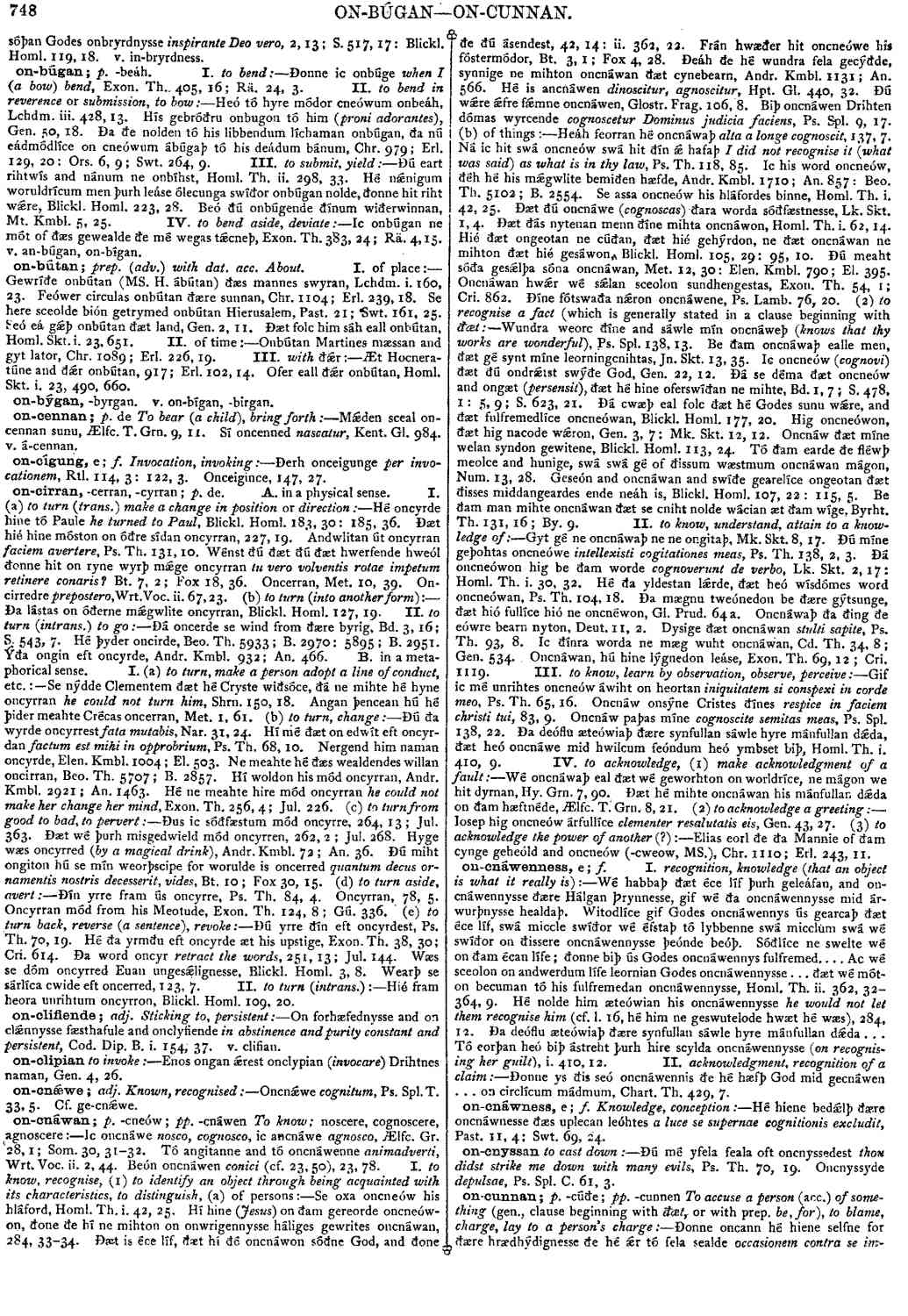on-cnáwan
- verb [ strong ]
-
Ic oncnáwe nosco, cognosco, ic ancnáwe
agnosco,
- Ælfc. Gr. 28, 1; Som. 30, 31-32.
-
Tó angitanne and tó oncnáwenne
animadverti,
- Wrt. Voc. ii. 2, 44.
-
Beón oncnáwen
conici
(cf.- 23, 50), 23, 78.
-
Se oxa oncneów his hláford,
- Homl. Th. i. 42, 25.
-
Hí hine (
Jesus
) on ðam gereorde oncneówon, ðone ðe hí ne mihton on onwrigennysse háliges gewrites oncnáwan,- 284, 33-34.
-
Ðæt is éce líf, ðæt hí ðé oncnáwon sóðne God, and ðone ðe ðú ásendest,
- 42, 14: ii. 362, 22.
-
Frán hwæðer hit oncneówe his fóstermódor,
- Bt. 3, 1; Fox 4, 28.
-
Ðeáh ðe hé wundra fela gecýðde, synnige ne mihton oncnáwan ðæt cynebearn,
- Andr. Kmbl. 1131; An. 566.
-
Hé is ancnáwen
dinoscitur, agnoscitur,
- Hpt. Gl. 440, 32.
-
Ðú wǽre ǽfre fǽmne oncnáwen,
- Glostr. Frag. 106, 8.
-
Biþ oncnáwen Drihten dómas wyrcende
cognoscetur Dominus judicia faciens,
- Ps. Spl. 9, 17.
-
Heáh feorran hé oncnáwaþ
alta a longe cognoscit,
- 137, 7.
-
Ná ic hit swá oncneów swá hit ðín ǽ hafaþ
I did not recognise it (what was said) as what is in thy law,
- Ps. Th. 118, 85.
-
Ic his word oncneów, ðéh hé his mǽgwlite bemiðen hæfde,
- Andr. Kmbl. 1710; An. 857: Beo. Th. 5102; B. 2554.
-
Se assa oncneów his hláfordes binne,
- Homl. Th. i. 42, 25.
-
Ðæt ðú oncnáwe (
cognoscas
) ðara worda sóðfæstnesse,- Lk. Skt. 1, 4.
-
Ðæt ðás nytenan menn ðíne mihta oncnáwon,
- Homl. Th. i. 62, 14.
-
Hié ðæt ongeotan ne cúðan, ðæt hié gehýrdon, ne ðæt oncnáwan ne mihton ðæt hié gesáwon,
- Blickl. Homl. 105, 29: 95, 10.
-
Ðú meaht sóða gesǽlþa sóna oncnáwan,
- Met. 12, 30: Elen. Kmbl. 790; El. 395.
-
Oncnáwan hwǽr wé sǽlan sceolon sundhengestas,
- Exon. Th. 54, 1; Cri. 862.
-
Ðíne fótswaða nǽron oncnáwene,
- Ps. Lamb. 76, 20.
-
Wundra weorc ðíne and sáwle mín oncnáweþ (
knows that thy works are wonderful
),- Ps. Spl. 138, 13.
-
Be ðam oncnáwaþ ealle men, ðæt gé synt mine leorningcnihtas,
- Jn. Skt. 13, 35.
-
Ic oncneów (
cognovi
) ðæt ðú ondrǽtst swýðe- God, Gen. 22, 12.
-
Ðá se déma ðæt oncneów and ongæt (
persensit
), ðæt hé hine oferswíðan ne mihte,- Bd. 1, 7; S. 478, 1: 5, 9; S. 623, 21.
-
Ðá cwæþ eal folc ðæt hé Godes sunu wǽre, and ðæt fulfremedlíce oncneówan,
- Blickl. Homl. 177, 20.
-
Hig oncneówon, ðæt hig nacode wǽron,
- Gen. 3, 7; Mk. Skt. 12, 12.
-
Oncnáw ðæt míne welan syndon gewitene,
- Blickl. Homl. 113, 24.
-
Tó ðam earde ðe fléwþ meolce and hunige, swá swá gé of ðissum wæstmum oncnáwan mágon,
- Num. 13, 28.
-
Geseón and oncnáwan and swiðe gearelíce ongeotan ðæt ðisses middangeardes ende neáh is,
- Blickl. Homl. 107, 22: 115, 5.
-
Be ðam man mihte oncnáwan ðæt se cniht nolde wácian æt ðam wíge,
- Byrht. Th. 131, 16; By. 9.
-
Gyt gé ne oncnáwaþ ne ne ongitaþ,
- Mk. Skt. 8, 17.
-
Ðú míne geþohtas oncneówe
intellexisti cogitationes meas,
- Ps. Th. 138, 2, 3.
-
Ðá oncneówon hig be ðam worde
cognoverunt de verbo,
- Lk. Skt. 2, 17: Homl. Th. i. 30, 32.
-
Hé ða yldestan lǽrde, ðæt heó wísdómes word oncneówan,
- Ps. Th. 104, 18.
-
Ða mægnu tweónedon be ðære gýtsunge, ðæt hió fullíce hió ne oncnéwon,
- Gl. Prud. 64 a.
-
Dysige ðæt oncnáwan
stulti sapite,
- Ps. Th. 93, 8.
-
Ic ðínra worda ne mæg wuht oncnáwan,
- Cd. Th. 34, 8; Gen. 534.
-
Oncnáwan, hú hine lýgnedon leáse,
- Exon. Th. 69, 12; Cri. 1119.
-
Gif ic mé unrihtes oncneów áwiht on heortan
iniquitatem si conspexi in corde meo,
- Ps. Th. 65, 16.
-
Oncnáw onsýne Cristes ðínes
respice in faciem christi tui,
- 83, 9.
-
Oncnáw paþas míne
cognoscite semitas meas,
- Ps. Spl. 138, 22.
-
Ða deóflu æteówiaþ ðære synfullan sáwle hyre mánfullan dǽda, ðæt heó oncnáwe mid hwilcum feóndum heó ymbset biþ,
- Homl. Th. i. 410, 9.
-
Wé oncnáwaþ eal ðæt wé geworhton onworldríce, ne mágon we hit dyrnan,
- Hy. Grn. 7, 90.
-
Ðæt hé mihte oncnáwan his mánfullan dǽda on ðam hæftnéde,
- Ælfc. T. Grn. 8, 21.
-
Iosep hig oncneów árfullíce
clementer resalutatis eis,
- Gen. 43, 27.
-
Elias eorl ðe ða Mannie of ðam cynge geheóld and oncneów (-cweow,
- MS.), Chr. 1110; Erl. 243, 11.
Bosworth, Joseph. “on-cnáwan.” In An Anglo-Saxon Dictionary Online, edited by Thomas Northcote Toller, Christ Sean, and Ondřej Tichy. Prague: Faculty of Arts, Charles University, 2014. https://bosworthtoller.com/24487.
Checked: 0